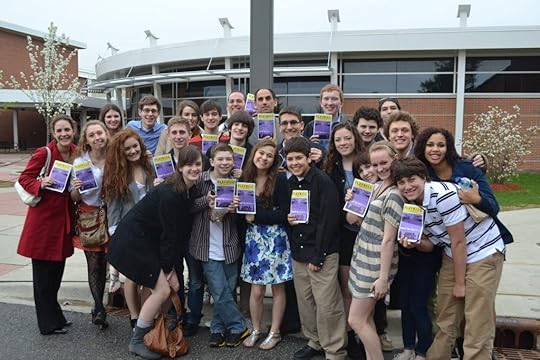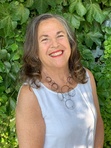Another Teacher Role Model

Today I bring you another former student who has become an excellent teacher. She and I reminisced about her successes and struggles as my student and now as a teacher herself.
A while back, I wrote, “Even as I struggle with the current teacher shortage and an inadequate teacher pipeline, I find hope in the passion and commitment of some teachers currently in the classroom.” That’s still true. Julie Robinson Hill is one of those teachers, decades after she was my student.
Julie initially set out to be a principal because she didn’t see enough women administrators. Although she started as a theater major, she wanted a day job that was more predictable and switched to English and Secondary Education, a fortuitous choice because, once she got in the classroom, she realized she liked working with students more than she’d like administration. After 21 years, Julie retains the passion that brought her to her students.
Before Covid, Julie loved teaching theater and fine arts. She believes those classes really help with belonging. Online learning during the pandemic shifted that and put her in English full-time. After a year, the school turned her theater office into a costume closet, and kids no longer get to gather and build community there. That saddens her, but Julie has found camaraderie and new challenges in teaching English. At first, she felt unprepared to teach Creative Writing, but she found her way. She even uses some of the exercises and prompts she remembers from my creative writing class!
Julie still talks about her years teaching theater a bit wistfully. She spent fifteen years doing that, nine of them theater only. She found herself working on all cylinders for productions, especially when she collaborated with a friend on the show Spelling Bee and felt she had a perfect cast that rose to high levels of excellence. That show ended up in the High School Theater Festival and went downstate, the artistic and collaborative pinnacle of her career at that point.
Now Julie transfers that passion and drive for excellence to her English classes. She gets to know so many more kids and see different sides of them. She has a different demographic than her theater kids, but these students also love performing with her guidance. They do podcasts and open mikes at ARC [Academic Resource Center] Fest; they choose and workshop their projects.
I asked Julie what has been most surprising to her as a teacher. She responded, “You don’t realize from the teacher side that many things that you need to do end up weaving together in awe-inspiring ways. You pull on things from your life.” She finds that when she’s working with kids, “everything else melts away – that magic is always there.”
A bit of a people-pleaser by nature, Julie has learned to let things roll off her back more. When theater parents were upset about the part their student got [or didn’t get], they might have preferred to believe it’s her fault instead of accepting that someone else was a better fit, but she’s learned to let that go. She uses rubrics in English to help explain students’ grades, but she acknowledges that there’s an element of subjectivity and has learned to get on the same page as parents most of the time.
Since the pandemic, the biggest issue she sees is that students, parents, and even counselors believe that students need more downtime, while she believes too much downtime leads to procrastination and feeds anxiety. She encourages her students to take a fun class or peer mentor special needs students; that way they would feel less stressed and more productive and more part of a community. Julie says her students crave community, want to feel good about themselves, and want to be challenged. She builds community and creates challenges in class.
What advice would she give to new teachers, parents, and/or the public at large? Julie acknowledges that it’s a hard time to go into teaching, that teachers have less autonomy than they used to, but that it’s worth it. She would tell a young teacher, ““If you have the drive and passion, if you seek a life of creating with young people, then find a mentor and go all in.” She has been mentored one-on-one by a retired teacher who helped her see what wasn’t working and why; she calls that the “greatest “cup-filler” of her career. Teaching is not just a job to Julie; it’s her calling. She would encourage parents to allow their kids to experience adversity and grow from it. “The thing that builds character and gives kids a sense of who they are and who they need to be is adversity.” Her teaching is an investment not only in her students’ academics but in their approach to the future.
Julie loves teaching adolescents because they may present as very sophisticated but aren’t yet set in their ways. So many kids come back and giggle about how they were and how much they’ve grown. She knew she liked kids when going into teaching but didn’t know how much she’d enjoy playing a small role in helping them discover themselves, take a loss, and develop some grit. She finds that being close to them is a fountain of youth for her and helps her feel optimistic. She finds it thrilling to see them start to develop their own set of beliefs rather than just parroting parents.
Julie really enjoys getting to know students outside of class, too. She has traveled with kids and done extracurricular with them, and she just went to a school hockey game for senior night, discovering a whole different world that had her seeing those boys differently. She also worked with students on a food drive for a food pantry and relishes these connections. As the mother of three children under six right now, she’s had to scale back, but she still finds some time to know her students outside of class.
In the current system, Julie feels that students and families respond to incentives like weighted grades too much. She wishes students felt more of a sense of choice and that they might take classes because they’re interesting and different instead of packing their days with AP classes and creating frustrating workloads.
She herself, like all teachers, has a huge workload, so she’s learning to make peace with not being able to return some work as fast as she wants. She’s working on giving more formative feedback in class and being more selective in the other feedback she gives. Although Julie remains committed to extensive feedback in creative writing, she realizes that she needs to be thoughtful about what she chooses to collect. She sees focusing on critical thinking skills as leading to better writing.
Like many veteran teachers, Julie has faced numerous changes and challenges, but her passion for teaching and determination to support and engage her students sets her apart. She has adapted to change after change, making her an invaluable role model. Teachers like Julie Robinson Hill give us hope about the future of education.



